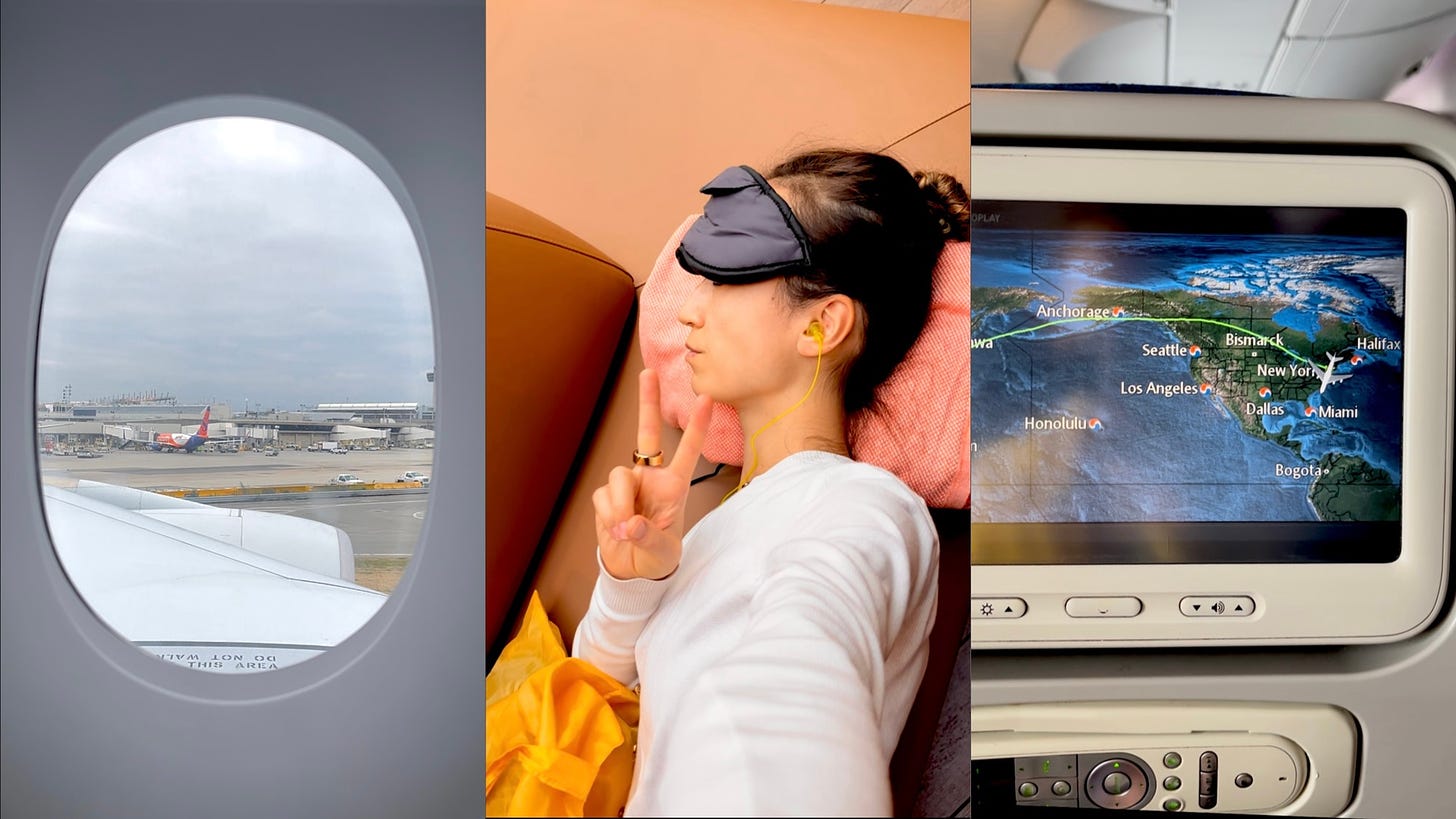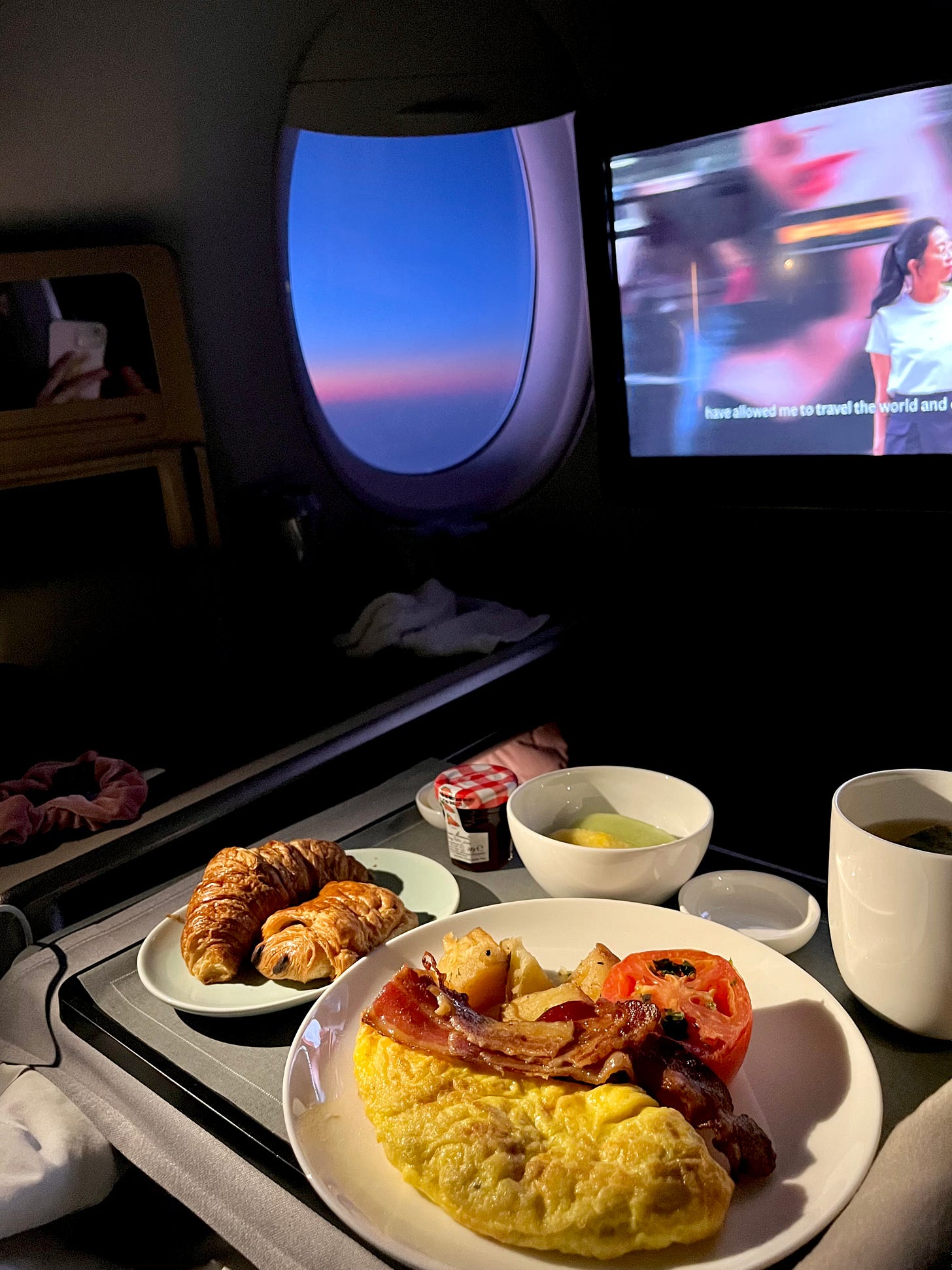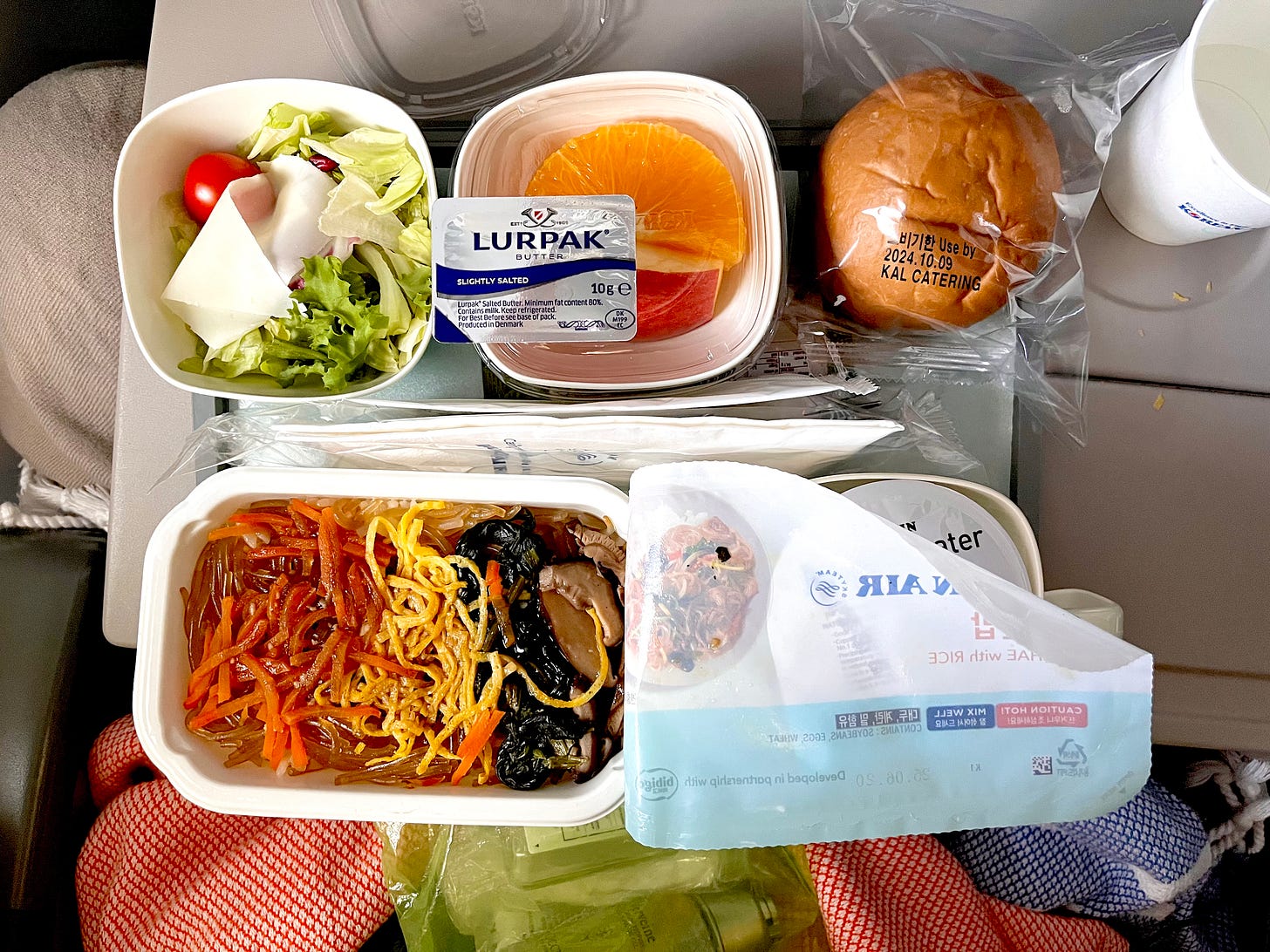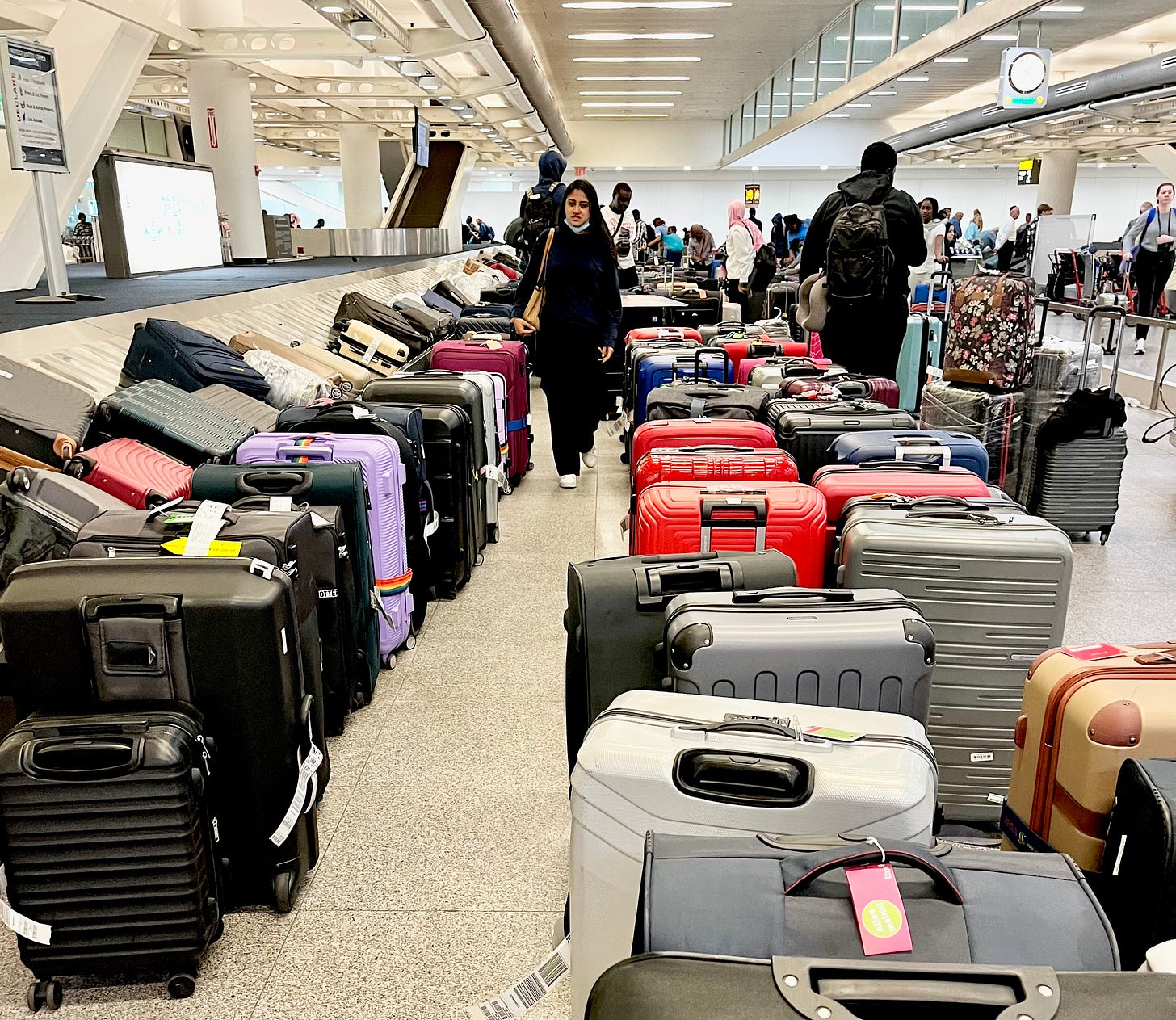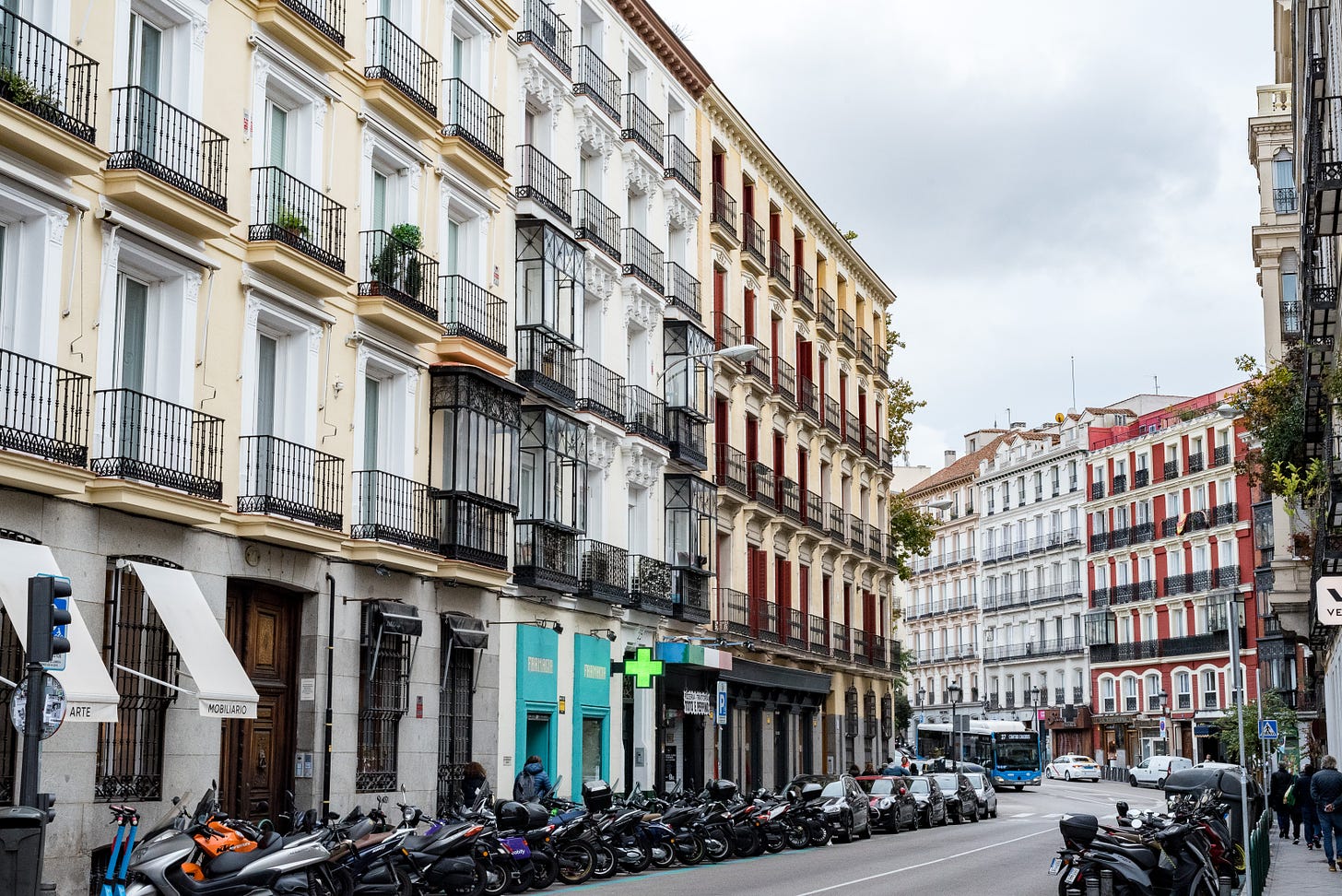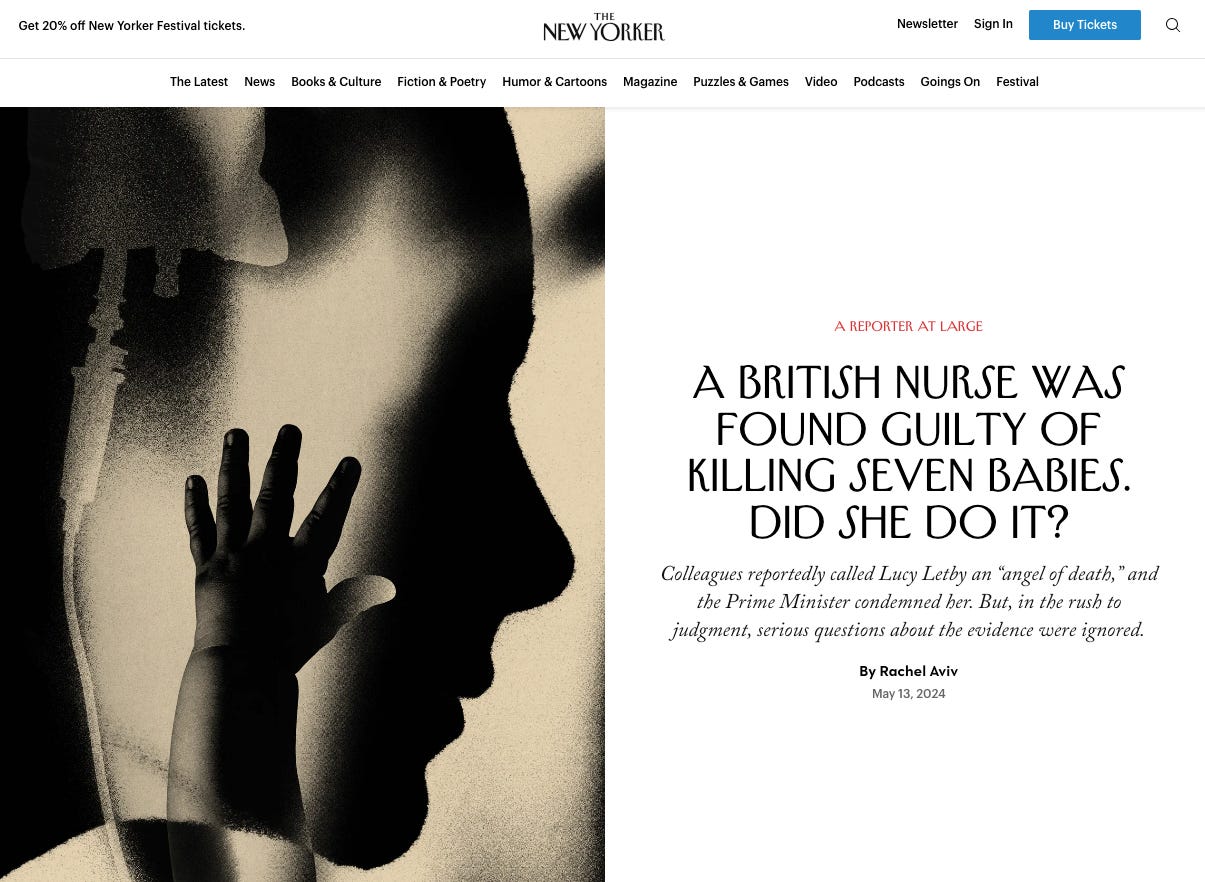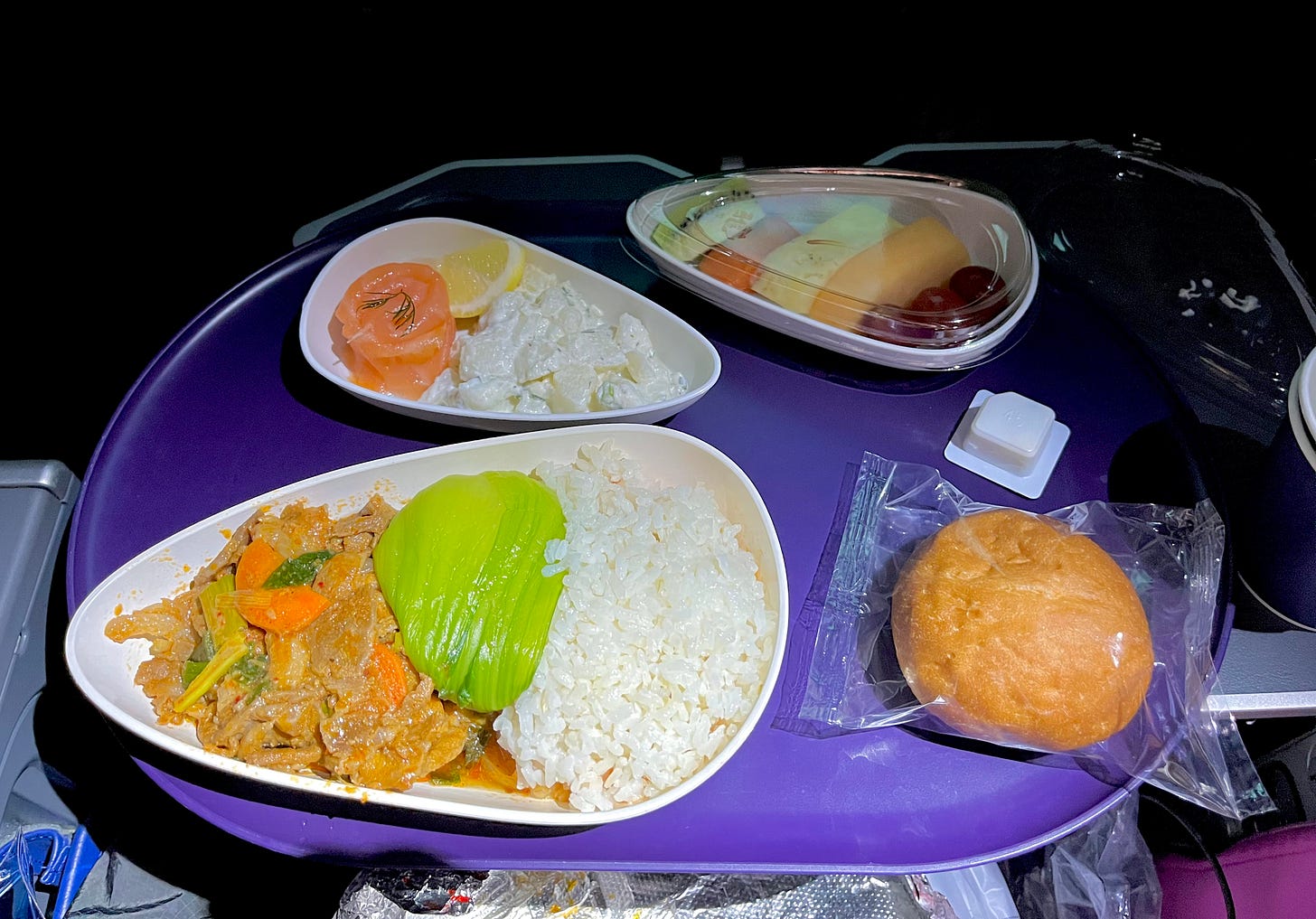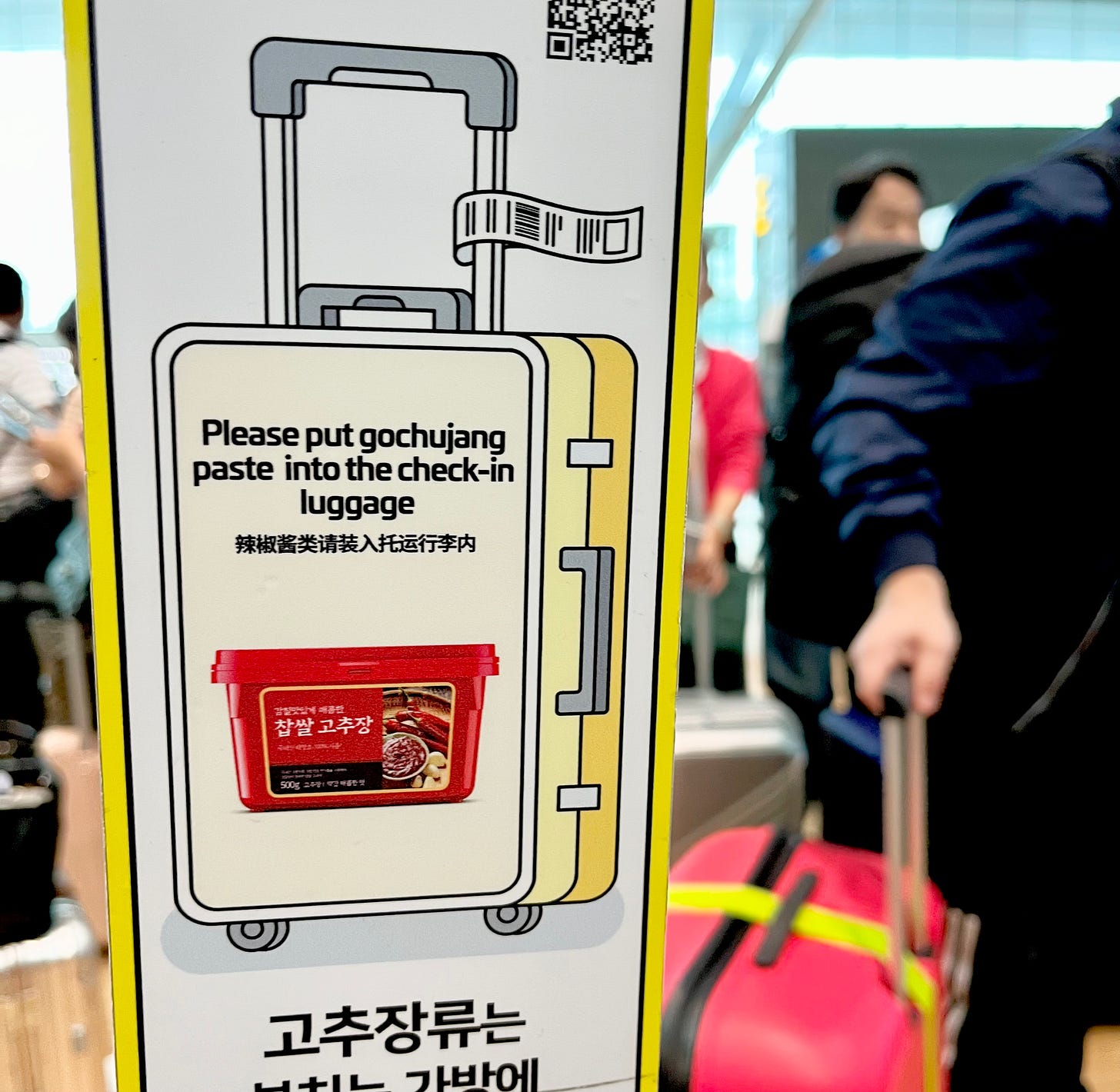Three Hot Travel Takes
On raw-dogging, red-eyes and prioritizing rest. Plus, an underrated foreign film, unnerving British investigation and Korean airline comparison.
I’ve been flying regularly for over a decade but it’s only in the past month or so I’ve noticed a few of my stances on air travel shift. In light of my fresh outlook, I thought I’d share three hot takes when it comes to optimizing air travel, in hopes it might encourage reflection on whether your own flying strategies are working for you.
The Red-Eye Is Sacred
I have a hard enough time sleeping on land so I’ve always detested the red-eye flight. But flying to Europe or Asia, it’s inevitable. I recently was heading to JFK at 10 p.m. for my red-eye to Rome and I noticed my dread lift. First, I was struck by how easy commuting at night was compared to the day, there’s no rush hour traffic and I had almost the whole LIRR train to myself. Then, once on the air train, I looked around at the few passengers and felt a sense of camaraderie with them. They all had suitcases so I figured they were like me, about to embark on an overnight journey. At the airport, the vibe near the gate is totally different than during the day. There’s always people drinking at the airport bar, but at midnight, you get the sense those who are doing it really need a drink. In the bathrooms, you witness people conducting their bedtime routines—brushing their teeth, washing their face. And on the plane, people are in their most vulnerable position of all: sleeping. The red-eye flight crowd exhibits the humanity in people that we just don’t see during the day.
As my Norse red-eye took off, most people around me had already called it a night. But I wanted to stay up to look at the city from the sky at night. One of the reasons I’m a night owl is because I love the feeling of being the only one awake while everyone is peacefully asleep. But looking at the city that never sleeps from above, it became apparent that many people are, in fact, not sleeping. Cars twinkling through the illuminated arteries of the city, a sprinkling of boats on the dark water—where are these people going? I wondered. Perhaps they’re heading to their night shift, or returning home from a night out.
A couple weeks ago, I was on another red-eye flight, this time to Seoul. I noticed a woman limp past me en route to the bathroom and I immediately identified by the way her one side was paralyzed, that she was a brain injury survivor, like my mom. As I closed my eyes in pursuit of sleep, I thought of my mom. She used to tell me heaven was located above the clouds and whenever we flew, I would challenge her—“mom, why don’t we see any angels outside our window?” As I lay in the dark, over what I imagined to be a sea of black, I realized we are closer to death when we’re flying—we’re closer to the spirits above (if you believe in that) and our own mortality, given the risk of flying. I cried, softly, in this metal tube full of strangers. When the tears come in my apartment I usually suppress them—the weight of sadness feels heavier in isolation. But here, with the safety blanket of company, I cried freely.
I still don’t know how to sleep well on a plane, and I always feel like a walking zombie for my first day upon landing, but I recently realized I can reduce my red-eye anxiety by reframing the flight itself from a dreaded experience to a sacred one that offers a rare perspective of the world.
‘Raw-Dogging’ Your Flight Is A Terrible Idea
On a 14-hour return flight in economy from Seoul this week, I witnessed raw-dogging firsthand. The young man, who looked to be around 20, turned down all meals and snacks, even water. He didn’t watch any in-flight entertainment, he just sat there, for 14 hours. Observing him like he was a mouse in an experiment, I noticed him decline gradually over the course of the flight. By the end, he was slumped over, barely able to keep his eyes open. After the flight, when he was reunited with friends, I overheard him say that was the worst flight ever.
If you haven’t heard of it, raw-dogging your flight means sitting for the duration of the flight without food, water, sleep or any distractions (which means no movies, TV, music, etc.). It’s the latest approach of the male optimization crowd, intended to demonstrate the “power of the mind.” I know we all want a fix-all solution to jet-lag but I’m afraid there are too many things working against us: the lack of oxygen and humidity on the plane, the circadian rhythm, the long periods of sitting, sleep deprivation. There are countless products and protocols for addressing all of these issues but the most recent trending solution is particularly extreme, and I would argue, dangerous.
While I’ve never fully raw-dogged a flight, I did used to be extremely restrictive when it comes to food. Convinced that eating big meals on the plane would cause bloating, I used to eat very little, prioritizing liquids (like protein shakes and smoothies) over solids for optimal digestion. In recent years, I’ve completely flipped my approach: now I actually eat more than usual on travel days. Why? Because travelling is exhausting and the body needs fuel. Since I can’t sleep on planes, I treat food like energy. With less reserves to work from, my dietician tells me I need more fuel to keep the body going. And when it comes to countering jet-lag, I find the best way to reset my eating schedule is to just make sure I’m eating every 3-4 hours. The body can’t tell the difference between breakfast or dinner, it just knows food is food.
The result? I find over-fuelling on travel days has had better outcomes than under-fuelling. I arrive less tired, sleep better once I’m on land, and adjust to the time change faster. So please, don’t raw-dog your next flight. You’re not proving anything to anyone.
The Plane Is A Container Removed From Everyday Life, Take Advantage Of This
I’m low-key a workaholic so I’ve never been one to spend a whole flight watching the in-flight entertainment. While increasingly more planes have Wi-Fi, I never use it, instead treating the plane as a rare opportunity to disconnect. Without the constant ping of notifications and emails distracting me, I find the plane is one of the few places I can find deep focus. I’ve heard that the reduced oxygen makes us less smart on planes than we think we are, but I still find I’m highly productive on them. So much so that I actually get excited for a long flight, because it means I’ll be able to land with a significantly lighter load of work that needs doing.
When I spilled water on my laptop within an hour of my nine-hour flight home from Switzerland last month, I was unable to work. I realized I’ve never not worked on a plane before, and the idea of spending eight hours solely watching in-flight entertainment felt way too indulgent. I wasn’t about to raw-dog it and sit in silence, so I watched a Korean film and napped, and I have to say…I think I liked it. I found I landed much more rested than I usually feel when I spent the whole flight working. I realized that the same conditions that facilitate my deep focus during flights—being a container that’s disconnected from the world—can also facilitate deep rest.
Best,
Anna
Published 📝
Forbes - How To Spend A Stylish Weekend In Madrid, Spain
Existing in the shadow of popular Spanish destinations like Barcelona and Seville, Madrid is arguably the country’s most overlooked city. But the bustling capital is so much more than the country’s financial hub. From watching a traditional flamenco shows to eating tapas in a 19th century taberna to roaming the eclectic vintage shops of Malasana, Madrid offers the perfect balance of old and new.
Reading 📖
🧳 What it’s like to be a luxury hotel inspector.
🥹 On seeing home with fresh eyes after a trip.
“Often we characterize wanderlust or ennui in terms of wanting more: more novelty, more experiences. I wonder how often those longings are borne less of true lack than of a dulled perspective—an inability to see the beauty in one’s immediate surroundings because they’re covered in what Vita Sackville-West called ‘the little strings and cobwebs of habit’ (in a love letter to Virgina Woolf). Sometimes, rather than something new, we need to locate a way of seeing the same old stuff anew.” -Haley Nahman.
🗳 Why does Kamala Harris look younger than Tim Walz?
👭 The vexing problem of the medium friend.
🇵🇸 A beautiful, heartbreaking poem about Gaza.
When we die, our souls leave our bodies,
take with them everything they loved
in our bedrooms: the perfume bottles,
the makeup, the necklaces, and the pens.
In Gaza, our bodies and rooms get crushed.
Nothing remains for the soul.
Even our souls,
they get stuck under the rubble for weeks. -Mosab Abu Toha.
🤣 Didn’t realize how much I have in common with Bowen Yang until reading this New Yorker profile.
👗 Is fashion art?
👯♀️ Parris Goebel is changing the way women move.
“There’s something cathartic about watching a group of (mostly) women snarling in lock step, an image of power and indomitability. These women might sleep with you, but they also might kill you.” -Coralie Kraft.
Watching 📺
One upside to not being able to work on my flight back from Switzerland last month was ample time to fill with movies. I took advantage of Delta’s impressive foreign film selection to watch a Korean film under the ‘critically acclaimed’ section, Broker. The premise: when a mother who abandoned her baby returns to the two brokers who are trying to sell the orphan on the adoption black market with second thoughts, the three embark on a journey to find the right couple for her child. Eventually we find out the two brokers (one of whom is played by Song Kang-ho, the dad in Parasite) who runs the illegal baby smuggling business, as well as the mother, are orphans in their own way too and as their road-trip ensues, they begin to feel like their own quirky family unit.
I’m a sucker for cinematic metaphors, and there are many throughout the film. One of my favorites is a scene in which the orphaned boy who has joined their road-trip rolls down one of the windows as they’re driving through a car wash. The entire car fills with soap and they all get soaked. In the scene that follows, the mother says, “this car is filled with liars.” Each of the characters has dirt on their hands, and is guilty of something, yet they all have an innate desire to get clean.
The tension between guilt and resolve; right and wrong is a recurring theme as the film asks questions like, can we understand a woman who throws away her baby? and would the child’s life have been better if they were raised by their birthmother? The latter question interests me the most as my own mother was adopted. What Broker revealed to me is that we tend to assume the path-not-taken would’ve been better, but that’s not necessarily true. It never occurred to me that a mother could give her child up for adoption because she believes the child’s life would be worse in her care. The line, “he wasn’t abandoned, he was protected,” shook me.
Listening 🎧
Similar to Broker, this investigative New Yorker piece toys with the idea of guilt and morality when it comes maternal care. (It isn’t a podcast but any article that has an audio recording over 30 minutes, I listen to instead of read). Lucy Letby, a British nurse working in material care, was found guilty of killing seven babies and attempting to kill seven others. Her ten-month murder trial, one of the longest in British history, captivated the United Kingdom. The Guardian, which published more than a hundred stories about the case, called her “one of the most notorious female murderers of the last century.” Colleagues reportedly called her the “angel of death,” and even the prime Minister condemned her. But did she do it? An unnerving listen/read just in time for my favourite holiday.
Snacking 🍌
A year ago I devoted a newsletter to sharing my travel essentials and the list hasn’t changed much, but there have been two small additions to my suitcase I would recommend: compression socks and greens gummies. I’ve always been skeptical of the former but after wearing these on multiple 8+hour-long flights, I will say I notice a difference in how my body feels after the flight. I also am always looking for more ways to get my greens on the road, so I love that they now come in gummy-form, these are so yummy I honestly feel like I’m eating candy.
This week, I flew what I’ve always said is one of my favorite airlines, for the first time in over a decade—Korean Air. As much as I rave about the airline, I was nervous I wouldn’t feel the same way now that I’m older and past my backpacking days. I flew premium economy to Seoul on Air Premia, a budget Korean airline, and economy on Korean air for the return, and honestly I didn’t feel there was that much of a difference. The only major perk of premium economy on Air Premia was having more of a seat recline and foot rest, so I could get closer to actually falling asleep. But the food on Air Premia was disappointing. The two meals were smaller portions than Korean Air, and one of the dishes (white fish with steamed carrots and mashed potato for breakfast) was more bland than hospital food I’ve eaten. The only redeeming quality was an incredible chocolate mousse cake (but having it for breakfast at the end of a 15-hour flight was nauseating). There was just one snack, an apple carrot cookie, served between the two meals.
In comparison, Korean Air had a serve-yourself snack cart available for almost the entire duration of the flight, and the two meals were miles better. The first was a bean curd stew that I initially wasn’t going to get but am glad I did because it was delicious. The second was japchae served on rice. I’ve never seen japchae served this way and wished there was a protein but it was surprisingly good. The in-flight entertainment was also way better on Korean Air—Air Premia had maybe less than 10 movies and T.V. shows—all Korean—and very few of them English subtitles.


